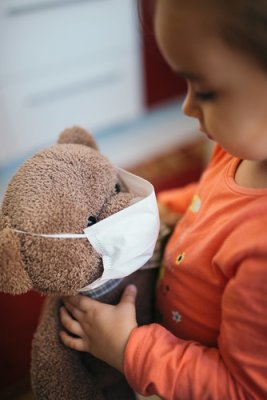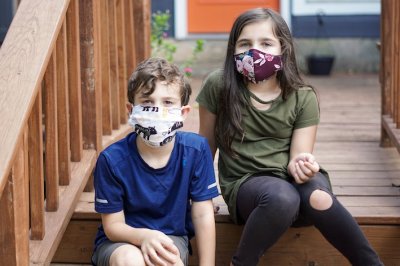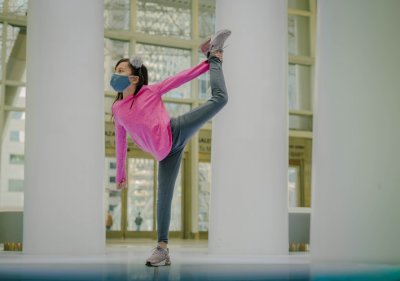Kids and Face Coverings – Does it Hurt Their Mental Health?

By: Nenad Stojkovic
Want your child to wear a mask, but worried you’d be doing the right thing when it comes to their wellbeing? Or has your child not been themselves lately? And you suspect it relates to mask wearing?
Do face coverings for kids affect their mental health?
Recent research from Germany around face coverings for kids caused uproar when its conclusions were turned into an infographic, shared all over social media.
It claimed that 66% of children wearing masks were irritable. 44% were less interested in going to school, with half unable to concentrate. 49% were less happy than usual, and over a third were experiencing learning difficulties.
The research was even used in a court case in France, with a group of parents and a lawyer demanding the government suspend compulsory mask wearing until aged 12.
Are masks making my kid unhappy?
But it turns out the German research has serious deficits. It is only based on a registry, where parents or family doctors log in and report information. While the numbers were impressive, with over 20,000 entries made in a week, it does not represent any direct study of children themselves.
And the glaring issue is not knowing the mental state of the parents, who might be projecting their own frustration at the Covid-19 situation (more on the power of that below). Or, say, using kids and face coverings as an easy excuse to hide recent problems with their parenting.
But what this survey does clearly show is that many parents and children are unhappy and distrustful about mask wearing. There is a clear need for better research and discussion.
From mask wearing to mental breakdown?
Back in September 2020, an article in the British Medical Journal (BMJ) concluded that mask wearing across age groups had more positives than negatives and should be focused on as a sociocultural phenomenon.

photo by Izzy Park
It didn’t go down well with others in the medical community. A German immunologist wrote a scathing response with a headline, “ Facemasks at school: a slippery slope from virus protection to mental breakdown?” She argued that:
“Facemasks prevent the mirroring of facial expressions, a process that facilitates empathetic connections and trust between pupils and teachers. This potentially leads to a significant increase in socio-psychological stress… [that can] escalate into mental behavioural problems.”
But new research shares a different story
But newer research is not all negative.
For example, a team at University of Edinburgh put out research in late December 2020 with data from 11,000 participants across the UK. And they not only found that mask wearing did not negatively affect mental health. They discovered that—
–those who wore masks ‘most of the time’ or ‘always’, even after controlling for behavioural, social, and psychological confounds, had better mental health and wellbeing than those who did not. They felt less depressed and anxious, and, surprisingly, less lonely.
This could suggest that mask wearing creates a feeling of solidarity, whether or not it slows virus transmission.
Of course this research was done on adults, and there isn’t a similar study yet done in the UK on children and face coverings. But there is general research around child mental health in the UK during the pandemic.
Child mental health during the pandemic
Research published in January 2021 in the Lancet psychiatry journal shows a marked if not extreme rise of 5.8% of mental health issues in children since the pandemic began. Reported issues include feeling lonely, sleeping poorly, and, in those who already had prior mental health issues, being afraid to leave the house.
The study suggests such mental health effects might relate more to the economic outcomes of the pandemic than things like mask wearing. Children from families with money issues were found to be more than twice as likely to report mental health issues.
This seems backed up by other research. For example, a study from the East of England showed a rise in depressive symptoms, whereas a study looking at a thousand preteens in wealthier south west England found ‘little overall change in anxiety, depression, or wellbeing’.
Is there a middle ground?
In an August 2020 report, the World Health Organisation (WHO) suggest three guidelines for mask wearing and children.
- “Do no harm” – prioritise the wellbeing of the child. They discuss, for example, that children with learning disabilities might do better with face shields.
- Choose guidance that doesn’t negatively affect development and learning outcomes.
- Consider the different social, cultural, and geographical contexts and what is or isn’t then feasible.
5 ways to help your child with mask anxiety
What can you do if you feel a kid’s face covering is distressing your child, or you and your child disagree on their use of a mask?
1. Ask good questions.
If you are very pro mask wearing and want your child to wear a mask outside of obligatory places like school corridors, do consider the World Health Organisation advice above.
- Is the mask wearing causing your child more upset than good?
- Is it affecting their ability to communicate and learn?
- Or making them feel socially outcast?
2. Talk to your child about face coverings.

photo by Jairo
This does not mean a lecture about why masks are or aren’t important, why you do or don’t agree with your child about kids and face coverings, or a pep talk where you speak at them instead of with them.
It does mean proper communication where you listen to your child fully, verify their feelings and opinions without judgment or feedback, and help them find a way to express their emotions and feel better.
A great book to help here (and that helps with parenting in general) is “How to Talk so Kids Will Listen and Listen so Kids Will Talk“, by Adele Faber.
3. Consider mask time in calming situations.
Child wearing a mask just at school, and hating it? If your young child already struggles with the school environment, where they don’t do well socially, or have learning difficulties? A mask can become a representation of this stress.
Consider changing this association by introducing masks in other, less stressful situations, like when watching their favourite TV show, or going to the toy store. Or make masks a team thing by buying matching masks.
4. Give advance warning.
If you are going into a situation where you’d like your young child to wear a mask, such as a doctor’s waiting room, don’t spring it on them at the last second. Let them know in advance they’ll have to wear a face covering when they get there.
5. Deal with your own anxiety.
The study on child mental health in the UK drew one strong conclusion — that parents set the standard. It states:
“Children with a parent in psychological distress were more likely to have a probable mental health problem. This is particularly concerning because parents, compared with working age adults without young children, have experienced larger than average increases in mental distress during the pandemic, which suggests that support for parents at this time matters for child mental health.”
If you want your child to be less anxious about mask wearing and the pandemic, you have to work to be less anxious yourself. If you are upset about mask wearing, or are suffering anxiety in general due to changes in your lifestyle due to Covid-19, then take your worries seriously and seek support if needed.
A counsellor or psychotherapist can not only help you manage your moods, they can help you troubleshoot your parenting and communicate better with your child.
Can’t stop being anxious lately, and it sticks around as much as the pandemic? Worried it’s affecting your child? We connect with some of London’s best rated talk therapists. Or use our online platform to book UK-wide registered counselling and online therapy.
Still have a question about face coverings and kids? Ask below.




